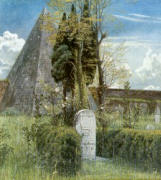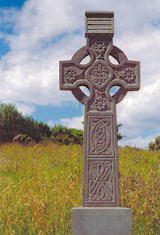History of All Hallows' Eve
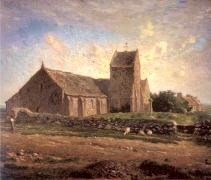 The Solemnity of All Saints (Overview - Calendar)
is celebrated on November 1. It is a solemnity, a holyday of obligation and the day that the Church honors all of God's saints, even those who have not been canonized by the Church. It is a family day of celebration—we celebrate the memory of those family members (sharing with us in the Mystical Body, the doctrine of the Communion of Saints) now sharing eternal happiness in the presence of God. We rejoice that they have reached their eternal goal and ask their prayers on our behalf so that we, too, may join them in heaven and praise God through all eternity.
The Solemnity of All Saints (Overview - Calendar)
is celebrated on November 1. It is a solemnity, a holyday of obligation and the day that the Church honors all of God's saints, even those who have not been canonized by the Church. It is a family day of celebration—we celebrate the memory of those family members (sharing with us in the Mystical Body, the doctrine of the Communion of Saints) now sharing eternal happiness in the presence of God. We rejoice that they have reached their eternal goal and ask their prayers on our behalf so that we, too, may join them in heaven and praise God through all eternity.
The honoring of all Christian martyrs of the Faith was originally celebrated on May 13, the date established by the fourth century. Pope Boniface IV in 615 established it as the "Feast of All Martyrs" commemorating the dedication of the Pantheon, an ancient Roman temple, into a Christian church dedicated to the Blessed Virgin Mary and all the martyrs. By 741, the feast included not only martyrs, but all the saints in heaven as well, with the title changing to "Feast of All Saints" by 840.
In 844, Pope Gregory IV transferred the feast to November 1st, timing it around the harvests to be able to provide food for the pilgrims. Some scholars believe this was to substitute a feast for the pagan celebrations during that time of year. Pope Sixtus IV in 1484 established November 1 as a holyday of obligation and gave it both a vigil (known today as "All Hallows' Eve" or "Hallowe'en") and an eight-day period or octave to celebrate the feast.
This feast is marked with liturgical observances that have changed over the centuries. By 1955, the octave and vigil of All Saints were abrogated. Instead of a separate vigil on the calendar, the celebration begins the evening before, as mentioned in The General Norms for the Liturgical Year and the Calendar:
Solemnities are counted as the principal days in the calendar and their observance begins with evening prayer of the preceding day. Some also have their own vigil Mass for use when Mass is celebrated in the evening of the preceding day.
In the Divine Office, or Liturgy of the Hours, solemnities and Sundays are begin with Evening Prayer I (the evening before) and Evening Prayer II (the evening of the solemnity).
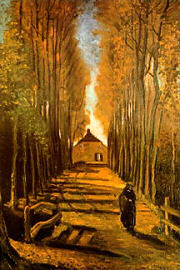 In England, saints or holy people are called "hallowed", hence the name "All Hallows’ Day". The evening, or "e'en" before the feast became popularly known as "All Hallows' Eve" or even shorter, "Hallowe'en".
In England, saints or holy people are called "hallowed", hence the name "All Hallows’ Day". The evening, or "e'en" before the feast became popularly known as "All Hallows' Eve" or even shorter, "Hallowe'en".
Many recipes and traditions have come down for this evening, "All Hallows’ Eve" (now known as Halloween), such as pancakes, boxty bread and boxty pancakes, barmbrack (Irish fruit bread with hidden charms), colcannon (combination of cabbage and boiled potatoes). This was also known as "Nutcrack Night" in England, where the family gathered around the hearth to enjoy cider and nuts and apples. In England "soul cakes" are another traditional food. People would go begging for a "soul cake" and promise to pray for the donor's departed friends and family in exchange for the treat, an early version of today's "Trick or Treat."
The Church designates November 2 as the Feast of All Souls, a day to pray for all the departed souls in Purgatory. The feasts of All Saints and All Souls fall back-to-back to express the Christian belief of the "Communion of Saints." The Communion of Saints is the union of all the faithful on earth (the Church Militant), the saints in Heaven (the Church Triumphant) and the Poor Souls in Purgatory (the Church Suffering), with Christ as the Head. They are bound together by a supernatural bond. The Church Militant (those on earth still engaged in the struggle to save their souls) can venerate the Church Triumphant, and the saints can intercede with God for those still on earth. Both the faithful on earth and the saints in heaven can pray for the souls in Purgatory. During these two days we see the Communion of Saints really in action!
On All Souls Day and November 1-8 one can gain plenary indulgences for the Poor Souls. See Praying for the Dead and Gaining Indulgences for more details.
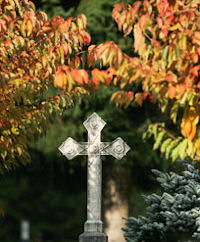 We have entered the 21st century. It is getting harder to be "in" the world but not "of" the world. How are we to tread carefully to find balance in a secular holiday? We have an onslaught of Halloween witches, ghosts, goblins, vampires, etc. everywhere we turn. How do we bring a message to our children to say that being a Christian does not mean that we cannot have fun and enjoy some secular practices? How do we convey that that we must not constantly be negative and condemn everything?
We have entered the 21st century. It is getting harder to be "in" the world but not "of" the world. How are we to tread carefully to find balance in a secular holiday? We have an onslaught of Halloween witches, ghosts, goblins, vampires, etc. everywhere we turn. How do we bring a message to our children to say that being a Christian does not mean that we cannot have fun and enjoy some secular practices? How do we convey that that we must not constantly be negative and condemn everything?
To answer this, we must to put on the mind of the Church. All through the centuries the Church has taken secular feasts and tried to "sanctify" or "Christianize" them. This is one of the reasons that December 25 was chosen for Christmas—that was the time of the winter solstice or Saturnalia festival, with many pagan traditions during their celebration. The feast day of All Saints itself came from the dedication of the Pantheon, a pagan temple, into a Christian church, undoubtedly another way of sanctifying the secular and pagan. Missionaries familiarize themselves with the culture and religion of the country before they can convert the native people. The missionaries have to be able find some elements in their culture that can help these people identify and understand Christianity at their level. St. Paul tried it with the Greeks. Seeing their altar to the Unknown God, he saw that through their own pagan altar he might bring them to Christianity.
It is beautiful to remember that we can recognize and enjoy simple earthly pleasures as gifts from God. Many of the practices of Halloween are innocent fun and some deal with healthy reminders of death, sin and the devil. Some parts of Halloween can be extreme. Since the All Saints and All Souls feasts are back-to-back, we can balance some of the focus of Halloween to the Communion of Saints in action. We combine honoring the saints in heaven, remembering our loved ones and then earn graces for our own souls by prayer and actions. Through this approach we see the Mystical Body in action.
There are many writings to help one explore the Christian roots of the Halloween festivities. In the activities section there are ideas for an All Hallows' Eve Party to present a fun atmosphere for children. See also other ideas from Florence Berger's Cooking for Christ and Mary Reed Newland's The Year and Our Children. These ideas help use every opportunity as a moment of grace, and a teaching lesson, not a spirit of avoidance of Halloween. One can use the opportunity to honor the saints, pray for the Poor Souls and prepare oneself spiritually for two great feastdays of the Catholic Church, All Saints' Day and All Souls' Day.
By Jennifer Gregory Miller, ©2003.


